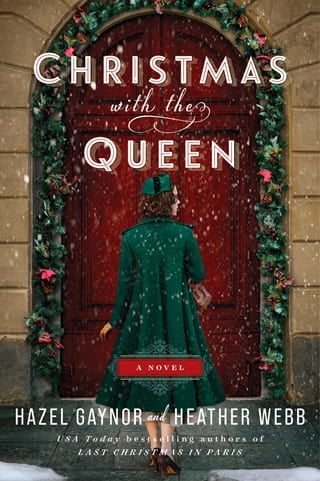Chapter 43 Jack
Chapter 43
Jack
London, August 1956
I reached for the set of keys on my nightstand and followed Mason outside. It was our day off from our duties at Buckingham Palace and, like all our free days now, we headed straight to the restaurant.
Our restaurant.
I still couldn’t quite get used to the idea, couldn’t believe the dream was—finally—becoming a reality. It had been a year and a half since I’d opened the note from Mrs. Howard, and discovered she was leaving her husband’s restaurant to me. My initial excitement had been followed by many months of frustration and delay, thanks to an estranged brother who’d contested Mrs. Howard’s will, causing legal headaches for her lawyers, and plenty of anxiety for Mason and me. When, at last, the verdict was decided in our favor nearly a year later, we had finally been able to start the extensive renovations the building needed to be at her best again.
As Mason and I walked, a steady warm drizzle pattered against the pavement. London rain, I called it. By the time we arrived, we were both soaked, and I was more than a little grouchy. I needed a decent night’s sleep, but my mind kept me awake, turning over all the things we still had to do. Today’s tasks were to go over the inventory lists, and deal with some persistent plumbing issues. I couldn’t wait to work on our menus and fire up the ovens, decorate the tables, and stock the wine cellar—but all in good time.
I was increasingly grateful that I wasn’t embarking on the project alone. Mason was at the center of every decision, and we were tirelessly working together on all of it; with his classical French training and my flair for spice and invention, we made a great team. We’d not only become good pals these last few years, but he was proving to be an excellent business partner. He’d been amenable to my leading as head chef and him being the second as sous-chef, but we both agreed he had veto power over menu items. A good compromise.
We spent long hours hunkered down together, drawing up plans, gutting the building, finding electricians, carpenters, plumbers and other tradesmen, and managing the necessary paperwork. At every stage of the renovation, we seemed to hit another snag. The heating had rattled so loudly that I couldn’t hear myself think, so the ducts had needed cleaning. Pipes, ceiling tiles, and damaged flooring had been replaced. Every problem, every mishap and setback had cost money, adding to the growing tab. The money Mrs. Howard had left was almost gone.
We’d lost so much time to legal battles and repairs, and had plenty more still to do, but at last we were able to think about opening in the fall, or early the following year at worst. In the meantime, we continued to work hard in our roles at Buckingham Palace. It was a godsend to live in the staff accommodation, allowing us to save our wages as the money from Mrs. Howard quickly dwindled. On days off, we dedicated ourselves to the restaurant.
As I stepped inside and flipped on the lights, the smell of fresh paint rushed my senses. We’d had the walls painted a warm butter yellow, the wainscoting white, and the mahogany chairs were dressed with elegant burgundy cushions. Colorful paintings of scenes from the streets of New Orleans decorated the walls—a jazz band, the famous two-story building with curled iron railings on the corner of Bourbon Street and Toulouse, and a picture of a Garden District plantation home with a large oak tree dripping with Spanish moss that I’d saved from Grandpa’s restaurant. The crowning piece was a brass chandelier in the middle of the room. Every detail made me beam with pride.
“Cup of tea?” Mason asked, rubbing his hands together. “I’m parched.”
“Me, too. Sounds great.”
We sat together for hours with the ledger, adding up costs, making predictions for the next few months, recording totals in the margins until my head ached. We’d conferred with other chefs we knew, picking their brains for a sense of likely running costs and customer numbers. I really disliked the business end of things, but I knew it was important, so I made myself concentrate.
Eventually, a knock at the front door gave us an excuse to take a break.
“Must be the sign,” I said, jumping down from my stool. We were expecting the delivery of the new sign to hang above the entrance outside. I couldn’t wait to see how it looked.
“Jack Devereux?” the man asked as I opened the door.
“That’s me.”
“We’re here to mount the sign, if you’re happy with it.”
Mason joined us. “Let’s have a look then!”
We’d talked through the design weeks before so everything should be in order, though not much had gone right during the renovation process so far. I hoped, for once, our luck would turn.
I held my breath as the man removed the burlap cloth. The large gilded sign was stunning, the script of the writing perfect. My heart skipped in my chest. Emotion welled in my throat.
I looked at Mason, who was smiling broadly. “It’s perfect. Let’s mount it.”
We went outside to watch the men at work as they decided on the safest way to lift it. Two of the workmen yanked on a pair of ropes fastened to a pulley, while two others balanced on ladders either side of the door. Carefully, slowly, the sign was raised into position.
I crossed the street to see how it looked. “Move it a foot to the right!” I called.
“I think it looks fine as is,” Mason said, flicking a cigarette butt to the ground.
“If you cross the street, you can see it’s off-center,” I replied. As the men hoisted the sign into the proper position, I shouted, “That’s it! Perfect!”
Hanging the sign was about the only thing that had gone smoothly since we’d begun renovating.
“You were right.” Mason clapped me on the back. “Finally, it looks like a restaurant.”
“It sure does,” I said.
It was perfect. A sense of pride and emotion washed over me as I admired the beautiful new sign, and the name we’d chosen for our new restaurant.
Andrea’s .
It had never been anything else to me, and Mason had been generous to agree that it was the right choice. It was an elegant name for an elegant restaurant, and I knew she would have loved it.
“All right, partner,” Mason said. “I’m heading out to the suppliers.”
“Great. Be tough with them about the prices. I’ll try out a few sample recipes. Start thinking about the menu,” I said.
Since Mason would be gone all afternoon, I’d decided to spend the time experimenting with recipes for our rotating menu of daily specials. The kitchen was, at last, mostly stocked with cookware and utensils, or at least enough for the items I looked forward to cooking: shrimp étouffée, pepper pot beef soup, and beignets filled with coconut rum cream, among dozens of other dishes.
I crossed the cobbled street that led to our front door, passing a pair of black lampposts that we’d positioned on either side of the arched entrance, exactly like those that decorated the French Quarter. A touch of home.
I’d scarcely made it through to the kitchen when a familiar face appeared in the small round glass window of the back door.
Olive, all smiles.
I waved her inside.
“I was just passing and thought I’d look in to see how it’s all going,” she said. “I wasn’t sure you’d be here on a Saturday. You really are putting in the hours. It’s looking great though.”
“It’s even better from the front,” I replied. “Come on. I’ve something to show you.”
Olive had been so happy for me when I’d told her about Mrs. Howard’s gift of the dilapidated old building. She understood more than most people what it was like to chase a dream. We’d seen each other a handful of times over the past year and a half, but not nearly as often as I’d have liked. Between the restaurant and the day job at the palace, my free time was limited, and she was busy making her mark at the BBC.
She was also busy with Lucy. And Peter. I still hated the thought of them together, but it seemed as if things were reasonably serious between them. I kept expecting to hear of their engagement. I’d tried to give up on the idea of anything more than friendship with Olive, and yet, every time I saw her, I found myself wishing things were different.
She hurried behind me as I rushed through the restaurant and out of the front door.
“Where are we going?” she asked.
“Close your eyes!” I guided her across the road, then turned her so that she was facing the restaurant and told her to open her eyes. “Ta-dah!”
She took a moment to respond as she looked at the new sign above the door.
I folded my arms across my chest and admired it again. “What do you think? It’s perfect, isn’t it? The color was Mason’s idea.”
She nodded as she stared at the gold and burgundy sign. “It’s perfect, Jack. She would love it.”
I saw the effort in her smile. The tone of her voice didn’t carry her usual enthusiasm. “Should we have painted it blue?” I asked, suddenly unsure. “That was my other thought. We still have time if you think—”
“No, I mean it. It is perfect. All of it. The color. The script. The name.” She pushed her hands into her coat pockets. “Anyway, I’d best be on my way or I’ll be late.”
“Going anywhere nice?” I couldn’t help myself asking.
She hesitated a moment. “The pictures. A matinee with Peter.”
Of course she was going with Peter. “Well, I won’t keep you. And I’ve plenty to do.” I tried to keep my voice light, even though my reaction was anything but.
As she turned to go, I remembered a promise I’d made to her. “Wait, I offered to teach you how to cook something for your dad, remember? So he can surprise your mom for her birthday? How about next week?”
“That would be great, if you’re not too busy.”
“Never too busy for you, Olive.” Even as I said it, we both knew it wasn’t true. We were always too busy for each other, it seemed, especially lately.
“What delights have you in store for us?” she asked. “Something hot and spicy from the Deep South?”
“Of course! By the time we’re finished, you’ll be fully converted to Cajun spices and marinades. No more boring English food for your family!”
“I doubt it. They’re highly suspicious of spicy food.”
“That’s because you Brits don’t know how to cook it! If I teach you how to make the dishes yourself, you’ll see them differently. Taste them differently. You’ll never eat dry meat pasties or bland mushy peas again.” I held out my hand. “Deal?”
Olive put her hand in mine and shook it as her face finally brightened. “Deal, chef. See you next week then.”
With that, she hurried off down the street. I stared after her, the feel of her hand still in mine.
 Fullepub
Fullepub 



